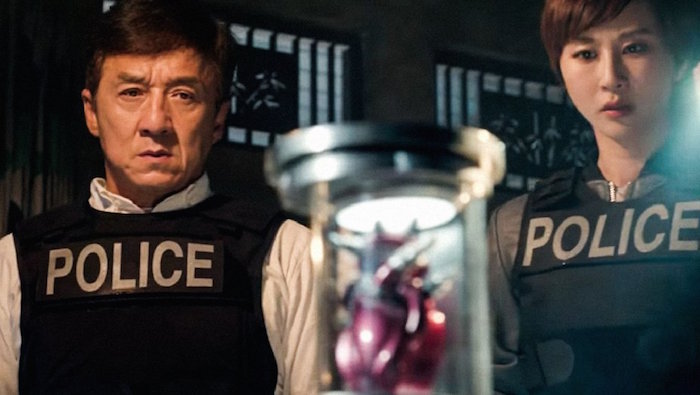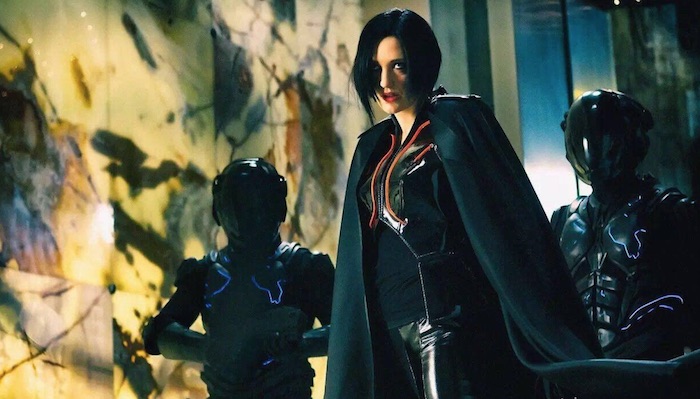BLEEDING STEEL
 Friday, January 5, 2018 at 8:55AM
Friday, January 5, 2018 at 8:55AM Stars: Jackie Chan, Show Lo, Ouyang Nana, Callan Mulvey, Tess Haubrich and Xiahou Yunshan.
Writers: Leo Zhang, Cui Siwei and Xiaohou Yunshan
Director: Leo Zhang.
Rating: 2/5

There is a special place in movie heaven for acts of such logic- and physics-defying cinematic lunacy as Leo Zhang’s Bleeding Steel, a momentously staged absurdity that almost endears itself through sheer relentless bombast. Largely shot in Sydney (or, more precisely, a graffiti-stained future version of the harbour city populated by basketball-playing American street teens, for some reason), this preposterous romp plays like a greatest hits version of star Jackie Chan’s most recognizable on-screen characterisations, but with dumbed-down dialogue, a garish colour palette and an audio track cranked to 11.
Ripping huge chunks of inspiration from the likes of Luc Besson’s sci-fi spectacle Lucy, Chan’s own kiddie romp The Spy Next Door and…oh, let’s go with Roland Emmerich’s Universal Soldier, Zhang’s hyper-charged, hardly-coherent head-spinner is a star-vehicle concoction for both old and new generations of Asia’s favourite film stars. The ageing action legend plays special operative Lin, who has dedicated the latter part of his career to covertly protecting his daughter, Nancy (Taiwanese cellist starlet Ouyang Nana), while never being able to reveal his true self to her. Also in a mix to ensure broad regional and demographic acceptance is The Mermaid star Show Lo, the Taiwanese idol ok as the handsome but bumbling offsider Leeson, and Erica Xia-Hou as Lin’s strong-willed career cop 2IC.
When a book is published revealing Nancy to be the missing link in a clandestine synthetic human initiative led Dr James (Kym Gyngell), the teen-queen Wolverine becomes the target of Andre (Callan Mulvey), a rotting Frankenstein-type behemoth who needs Nancy’s blood to regenerate. Despite barely being held together by his pale grey skin, Andre has amassed an army of black-helmeted alien types led by a leather-clad warrior-woman (Tess Haubrich, channelling Cate Blanchett’s Thor villainess; pictured, below), whose job it is to slay anyone stalling her quest to bring Nancy to Andre. That’ll do plotwise, suffice to say it spins in increasingly convoluted and largely indecipherable directions, with little regard for even the most basic action-movie realism.

Now well into his 60s and unable to dazzle with the same physical prowess he displayed as a younger action hero, Chan is nevertheless called upon to up the adrenalin for cast and audience (often with CGI enhancement); he occasionally appears somewhat bewildered by all that is unfolding around him. He has played this father/fighter/fumbler archetype before, most notably in his last three films (The Foreigner; Railroad Tigers; Kung Fu Yoga), all of which were far better suited to his age and talent. Chan’s signature large-scale stunt, the fight atop and spectacular descent from a big-city landmark (see his antics on Rotterdam’s Willemswerf Tower in 1998’s Who Am I? or the Hong Kong Convention Centre in 2004’s New Police Story) is dragged out again, this time perching him on the Sydney Opera House sails for some silly but spectacular fight scenes.
The most remarkable thing about Bleeding Steel (that awful title aside) is the tonal shifts employed almost frame-to-frame by director Zhang (who worked with the Chan clan on 2012’s Chrysanthemum of The Beast). Featuring broad slapstick humour, Bond-like gadgetry, Mission Impossible-type set-pieces, teen romance beats, some loopy science fiction tropes, schmaltz-rich sentimentality and, finally, knife-to-the-neck/chest-bursting ultra-violence, it is impossible to gauge what type of audience, other than the die-hard Chan completists, will feel wholly satisfied by this schizophrenic genre hodgepodge.
That Zhang and his cast play it with such straight-faced conviction at such a high pitch for all of the 110 minute running time does inspire in the viewer a ‘Stockholm Syndrome’-kind of respect for all involved, but that’s probably not what the producers (of which there are about four million) were aiming for.
 Action,
Action,  Asian Cinema,
Asian Cinema,  Hong Kong,
Hong Kong,  Jackie Chan,
Jackie Chan,  Sydney
Sydney 